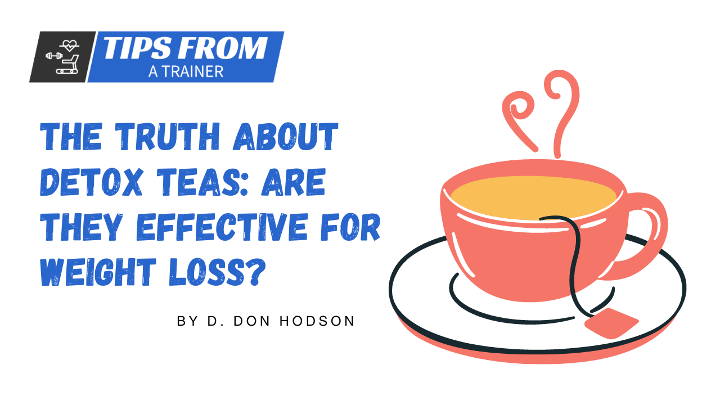Introduction
The Buzz Around Detox Teas
In recent years, detox teas have gained considerable attention in the realm of weight loss and health. Advertisements and social media influencers often tout these teas as miracle solutions for shedding pounds quickly and effortlessly. The allure of detox teas lies in their promises of rapid weight loss, improved digestion, and a sense of rejuvenation. As consumers seek effective strategies to manage their weight and achieve their health goals, detox teas have emerged as a popular option, capturing the curiosity of many. However, beneath the hype and promises, lies the need for a critical examination of these products and their purported benefits.
Unveiling the Reality
Amidst the hype surrounding detox teas, it is essential to approach their claims with skepticism and a discerning eye. Weight loss is a complex process influenced by numerous factors, including diet, physical activity, metabolism, and genetics. While detox teas may seem like a convenient and enticing solution, the reality is that achieving and maintaining a healthy weight requires a comprehensive and sustainable approach. It is crucial to delve beyond marketing slogans and explore the scientific evidence behind detox teas to understand their potential impact on weight loss.
Purpose of the Article
The primary aim of this article is to unravel the truth about detox teas and their effectiveness in promoting weight loss. By critically evaluating the scientific research and examining the ingredients and mechanisms behind these teas, we can provide readers with evidence-based insights to make informed decisions about their health and weight management strategies. It is our endeavor to equip readers with the knowledge and understanding they need to navigate the world of detox teas and separate fact from fiction.
Table of Contents
Introduction
The Buzz Around Detox Teas: Promises and Hype
Unveiling the Reality: What Science Says About Detox Teas
Purpose of the Article: Investigating the Effectiveness of Detox Teas for Weight Loss
Understanding Detox Teas
What Are Detox Teas? Ingredients and Claims
The Detoxification Myth: Separating Fact from Fiction
Potential Health Benefits: Beyond Weight Loss
The Science Behind Weight Loss
Caloric Intake and Expenditure: The Fundamental Equation
Thermogenesis and Metabolic Rate: The Role of Detox Teas
Appetite Suppression and Satiety: Examining Detox Tea Effects
Examining Detox Tea Ingredients
Common Ingredients: Green Tea, Herbal Extracts, and More
Caffeine and Its Impact on Weight Loss
Laxatives and Diuretics: Short-Term Effects vs. Long-Term Consequences
Scientific Studies and Evidence
Research on Detox Teas: Methodology and Findings
Mixed Results: Weight Loss Studies and Detox Tea Consumption
Placebo Effect and Psychological Impact: The Role of Perception
Potential Risks and Considerations
Short-Term Weight Loss vs. Sustainable Lifestyle Changes
Digestive Distress and Nutrient Absorption
Safety Concerns: Overuse, Interactions, and Pre-existing Conditions
Making Informed Choices
Educated Consumer: Reading Labels and Understanding Claims
Integrating Detox Teas into a Balanced Lifestyle
Consultation with Healthcare Professionals: Personalized Guidance
Conclusion
Separating Fact from Fiction: The Reality of Detox Teas
Empowering Your Health Journey: Holistic Approaches to Weight Management

Understanding Detox Teas
What Are Detox Teas?
Detox teas, often marketed as cleansing teas or weight loss teas, are herbal beverages formulated with a combination of ingredients that claim to facilitate detoxification and aid in weight loss. These teas typically contain a variety of herbs, botanicals, and other natural components that are believed to have cleansing and metabolism-boosting properties. Detox teas are often advertised as a means to flush toxins from the body, reduce bloating, and promote fat loss. Some common ingredients found in detox teas include green tea, dandelion root, ginger, nettle, and senna leaf.
The Detoxification Myth
One of the key selling points of detox teas is their promise of detoxification. However, it is important to clarify that the human body has a highly efficient and intricate system for detoxifying itself. The liver, kidneys, and other organs work together to process and eliminate waste products and toxins from the body. Detox teas do not possess magical powers to enhance this process beyond what the body is already capable of achieving. Claims of detoxification through tea consumption often lack scientific substantiation and can perpetuate a misconception about the body's natural cleansing mechanisms.
Potential Health Benefits
While the claims surrounding detox teas' ability to detoxify the body may be exaggerated, some potential health benefits can be attributed to the ingredients present in these teas. For instance, green tea, a common component of detox teas, is rich in antioxidants known as catechins, which have been studied for their potential to support overall health. Herbal ingredients like ginger and nettle may have anti-inflammatory properties, contributing to digestive comfort. Additionally, the act of staying hydrated by consuming herbal teas can have positive effects on general well-being.
The Science Behind Weight Loss
Caloric Intake and Expenditure
Weight loss fundamentally revolves around the balance between caloric intake and energy expenditure. When the number of calories consumed exceeds the number of calories burned through physical activity and metabolic processes, the excess energy is stored as fat, leading to weight gain. Conversely, creating a caloric deficit by consuming fewer calories than the body expends results in weight loss. This principle underscores the importance of mindful eating and regular physical activity in achieving and maintaining a healthy weight.
Thermogenesis and Metabolic Rate
Detox teas are often marketed for their potential to increase thermogenesis and boost metabolic rate. Thermogenesis refers to the process of generating heat within the body, which contributes to energy expenditure. While some ingredients found in detox teas, such as caffeine, may transiently elevate metabolic rate, the magnitude of this effect is generally modest and temporary. Long-term weight management requires sustained changes in caloric intake and physical activity rather than relying solely on short-term metabolic fluctuations induced by specific ingredients.
Appetite Suppression and Satiety
Another claimed benefit of detox teas is their potential to suppress appetite and enhance feelings of fullness, which could lead to reduced food intake and subsequent weight loss. While certain ingredients, such as fiber-rich herbs, might have mild satiating effects, it is important to note that appetite regulation is a complex physiological process influenced by various factors, including hormones, meal composition, and psychological cues. Detox teas alone are unlikely to significantly alter the intricate mechanisms that control hunger and satiety.
Examining Detox Tea Ingredients
Common Ingredients
Detox teas contain a range of ingredients, each purportedly contributing to their effects. Green tea, a frequently featured component, contains catechins that possess antioxidant properties and are associated with potential health benefits. Herbal extracts, such as dandelion root and nettle, are often included for their diuretic properties, which may lead to temporary water loss and a perceived reduction in bloating. However, it is crucial to understand that any initial decrease in weight due to water loss is not equivalent to sustainable fat loss.
Caffeine and Weight Loss
Caffeine, a central nervous system stimulant found in various detox teas, can temporarily boost metabolic rate and enhance alertness. Some studies suggest that caffeine intake may modestly contribute to energy expenditure and fat oxidation. However, the effects of caffeine on weight loss tend to diminish over time as the body develops tolerance. Moreover, the potential for increased heart rate and blood pressure, especially among caffeine-sensitive individuals, underscores the need for cautious consumption of detox teas containing caffeine.
Laxatives and Diuretics
Certain detox teas incorporate laxatives and diuretics to promote bowel movements and increase urine production, respectively. While these ingredients may lead to temporary reductions in body weight, they primarily induce water loss and do not reflect true fat loss. Prolonged use of laxatives and diuretics can disrupt fluid and electrolyte balance, potentially leading to dehydration, electrolyte imbalances, and digestive distress. The short-term effects of these ingredients should be carefully weighed against their potential long-term consequences.
Scientific Studies and Evidence
Research on Detox Teas
The efficacy of detox teas in promoting weight loss has been the subject of scientific inquiry. Researchers have conducted studies to investigate the potential effects of detox tea consumption on body weight, fat loss, and other relevant parameters. These studies employ various methodologies, including randomized controlled trials and observational analyses, to examine the relationship between detox tea consumption and weight-related outcomes.
Mixed Results
Findings from research studies examining the impact of detox tea consumption on weight loss have yielded mixed and inconclusive results. While some studies have reported minor reductions in body weight, body fat percentage, or waist circumference among individuals using detox teas, the magnitude of these effects is typically modest. Moreover, discrepancies in study designs, sample sizes, and follow-up durations contribute to the variability in reported outcomes.
Placebo Effect and Psychological Impact
The placebo effect, whereby perceived improvements occur due to psychological factors rather than a physiological response to treatment, can play a role in the reported effects of detox teas on weight loss. Positive beliefs and expectations regarding the efficacy of detox teas may lead individuals to experience perceived weight loss even in the absence of significant physiological changes. Moreover, the act of consuming detox teas as part of a weight loss regimen can create a sense of control and commitment that influences dietary choices and behaviors.
Potential Risks and Considerations
Short-Term Weight Loss vs. Sustainable Lifestyle Changes
Detox teas may provide short-term reductions in body weight, often attributed to water loss rather than actual fat loss. While initial weight loss can be appealing, it is essential to recognize that sustainable weight management requires comprehensive lifestyle changes. Relying solely on detox teas for weight loss neglects the importance of adopting a balanced diet and engaging in regular physical activity. Without lasting modifications to dietary habits and exercise routines, any temporary weight loss achieved through detox teas is likely to be regained once regular eating patterns resume.
Digestive Distress and Nutrient Absorption
Laxatives and diuretics found in some detox teas can lead to gastrointestinal discomfort, including cramping, bloating, and diarrhea. Prolonged or excessive use of these ingredients may disrupt normal digestive processes, impair nutrient absorption, and contribute to dehydration. Such consequences can have adverse effects on overall health and well-being, outweighing any potential short-term weight loss benefits.
Safety Concerns
The consumption of detox teas carries safety considerations, particularly for individuals with pre-existing health conditions or those taking medications. Some ingredients, such as caffeine and certain herbal extracts, can interact with medications or exacerbate underlying medical issues. Additionally, overuse of laxatives and diuretics can lead to electrolyte imbalances, which pose serious health risks. Before incorporating detox teas into their routine, individuals should consult healthcare professionals to ensure that the products are safe and appropriate for their individual health circumstances.
Making Informed Choices
Educated Consumer
As consumers navigate the array of detox tea products available on the market, it is essential to adopt an informed and critical approach. Reading labels is a fundamental step in evaluating the composition of detox teas. Familiarize yourself with the ingredients listed, paying special attention to potential allergens, additives, and preservatives. While manufacturers may make enticing claims about the weight loss benefits of their products, it is crucial to critically assess the scientific evidence supporting these claims.
Understanding claims is equally important. Terms such as "detoxification," "fat-burning," and "metabolism-boosting" may appear on packaging, but these assertions may lack scientific substantiation. Look for detox teas backed by peer-reviewed research and clinical studies that demonstrate their efficacy. Skepticism can guide consumers away from extravagant promises and toward products with credible scientific backing.
Integrating Detox Teas into a Balanced Lifestyle
Detox teas can potentially be incorporated into a balanced approach to health and wellness, but they should not serve as a sole strategy for weight loss. Rather than relying solely on detox teas, individuals should focus on establishing and maintaining a well-rounded lifestyle. A balanced diet rich in nutrient-dense foods, such as fruits, vegetables, whole grains, lean proteins, and healthy fats, is key to supporting overall health and sustainable weight management.
Regular physical activity is another cornerstone of a healthy lifestyle. Engaging in both cardiovascular exercises and strength training helps maintain lean muscle mass and contributes to caloric expenditure. Detox teas, if consumed, should be viewed as a complementary addition to these foundational practices, rather than a replacement for them.
Consultation with Healthcare Professionals
Prior to incorporating detox teas into a health regimen, it is strongly recommended to seek guidance from healthcare professionals. A consultation with a registered dietitian, nutritionist, or medical doctor can help individuals make informed decisions based on their specific health needs and goals. Healthcare providers can assess potential interactions with medications, evaluate any underlying health conditions, and offer personalized recommendations tailored to individual circumstances.
Engaging in a meaningful dialogue with healthcare professionals ensures that the integration of detox teas aligns with an individual's overall health and wellness strategy. By working collaboratively with experts, consumers can navigate the complex landscape of detox teas and make choices that promote long-term health and well-being.
Conclusion
The Reality of Detox Teas
In the realm of weight management and health, detox teas have garnered attention for their potential effects on weight loss. However, the scientific evidence surrounding the efficacy of detox teas is nuanced and often inconclusive. While some studies suggest minor reductions in body weight and fat mass, the variability in findings and the potential influence of psychological factors highlight the need for cautious interpretation.
Detox teas may provide short-term reductions in weight, but they should not be regarded as a panacea for weight loss. The inclusion of common ingredients like green tea, caffeine, and herbal extracts can potentially contribute to mild thermogenic effects and appetite suppression. Yet, the overarching principles of sustainable weight management involve comprehensive lifestyle modifications, including a balanced diet, regular exercise, and consultation with healthcare professionals.
Empowering Your Health Journey
As consumers embark on their health journey, it is essential to prioritize evidence-based practices and holistic approaches. The pursuit of well-being extends beyond quick fixes and promises of rapid weight loss. Empowerment comes from understanding the intricacies of weight management, critically evaluating product claims, and seeking guidance from qualified experts.
In the quest for lasting health and wellness, consumers are encouraged to make informed decisions rooted in scientific evidence. By separating hype from reality and embracing a holistic perspective, individuals can navigate the complexities of weight management with clarity and confidence. Remember that achieving and maintaining health is a gradual and multifaceted process, and the choices made along the way can shape a resilient and vibrant future.

Don Hodson, Certified Personal Trainer
I'm Don, an ACE-certified personal trainer and the founder of Tips From A Trainer. With my passion for fitness and years of experience, I've helped countless individuals transform their physiques!
Having personally overcome weight challenges throughout my life, I understand the struggle. Through consistency, exercise, and a balanced diet, I have managed to stay in shape and I want to share my message with the world!
The fitness industry is fraught with misconceptions and deceptive practices, which is why I am committed to providing you with the truth.
- My Site: www.Don-Hodson.com
- My Company: www.ConnectedAgeMarketing.com

The Truth About Detox Teas